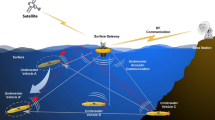Abstract
Transmission of video information from a submerged sensory source may lead to numerous applications such as surveillance, deep sea exploration, monitoring and repairing of underwater oil pipes etc. Such application requires a real time video transmission. It is obviously a challenging task to achieve efficient underwater video transmission because of the limited channel bandwidth and water is not a uniform medium due to which the transmitted signal is more error prone. Due to the limited spectrum, transmitted information must be compressed in a way that its quality does not deteriorate and at the same time, it must achieve low bit rate. In this regard, we propose an algorithm of temporal masking with Luma adjustment to reduce the video information for efficient transmission and reduce the need of over compression. Proposed algorithm is applied on the moving picture expert group (MPEG) video standard. A 2D-least mean squared adaptive filter (LMSAF) is embedded at the receiver end in order to reduce the effect of aquatic noises and further compensate the overall quality. Motion in the video sequence is exploited to extract motion vectors for temporal masking and also to achieve desired bit rate for acoustic applications. Structural Similarity Index Matrix (SSIM) acquired by implementing the proposed algorithm is 0.908 while the standard H.264/AVC was 0.925, but the compression ratio was reduced to 5.03 in comparison to 7.33, which clearly shows the significance of the proposed algorithm in reducing the information size.









Similar content being viewed by others
References
Zhang, Y., Li, Q., & Negahdaripour, S. (2015). Seafloor video compression using adaptive hybrid wavelets and directional filter banks. In OCEANS'15 MTS/IEEE Washington (pp 1–8). IEEE.
Zhang, Y., Li, Q.Z., & Negahdaripour, S. (2015). Seafloor image compression based on hybrid wavelets and directional filter banks. In Proceedings Oceans' 15.
Stojanovic, M., & Preisig, J. (2009). Underwater acoustic communication channels: Propagation models and statistical characterization. IEEE Communications Magazine, 47(1), 84–89.
Ribas, J., Sura, D., & Stojanovic, M. (2010). Underwater wireless video transmission for supervisory control and inspection using acoustic OFDM (pp. 1–9). IEEE.
Esmaiel, H., & Jiang, D. (2013). Multicarrier communication for underwater acoustic channel. International Journal of Communications, Network and System Sciences, 6(8), 361–376.
Farcas, A., Thompson, P. M., & Merchant, N. D. (2016). Underwater noise modelling for environmental impact assessment. Environmental Impact Assessment Review, 57, 114–122.
Hopewell, W., Lacovara, P., & Morris, M. (2016). High-bandwidth underwater data communication system. U.S. Patent No. 9,490,911.
Fautier, T. (2019). Next-Generation Video Compression Techniques. SMPTE Motion Imaging Journal, 128(2), 21–27.
Song, J., et al. (2018). Quantization-based hashing: a general framework for scalable image and video retrieval. Pattern Recognition, 75, 175–187.
Pompili, D., & Akyildiz, I. F. (2010). A multimedia cross-layer protocol for underwater acoustic sensor networks. IEEE Transactions on Wireless Communications, 9(9), 2924–2933.
He, C., Wang, H., Hu, Y., Chen, Y., Fan, X., Li, H., & Zeng, B. (2018). MCast: High-quality linear video transmission with time and frequency diversities. IEEE Transactions on Image Processing, 27(7), 3599–3610.
Wu, J., et al. (2016). Streaming high-quality mobile video with multipath TCP in heterogeneous wireless networks. IEEE Transactions on Mobile Computing, 15(9), 2345–2361.
Khalek, A. A., Caramanis, C., & Heath, R. W. (2015). Delay-constrained video transmission: Quality-driven resource allocation and scheduling. IEEE Journal of Selected Topics in Signal Processing, 9(1), 60–75.
Yeh, C.-H., et al. (2018). HEVC intra frame coding based on convolutional neural network. IEEE Access, 6, 50087–50095.
Wang, M., Ngan, K. N., & Li, H. (2015). An efficient frame-content based intra frame rate control for high efficiency video coding. IEEE Signal Processing Letters, 22(7), 896–900.
Maheshwari, J.P., et al. (2015). Robust digital image watermarking using DCT based pyramid transform via image compression. In 2015 International conference on communications and signal processing (ICCSP). IEEE.
Almurib, H. A. F., Kumar, T. N., & Lombardi, F. (2018). Approximate DCT image compression using inexact computing. IEEE Transactions on Computers, 67(2), 149–159.
Zhang, Y., Negahdaripour, S., & Li, Q. (2016). Error-resilient coding for underwater video transmission. In OCEANS 2016 MTS/IEEE monterey. IEEE.
Pathak, K., Arjunan, V. R., & Acharya, V. (2019). An innovative lossless image and video compression using revised S transformation. Journal of Advanced Research in Dynamical and Control Systems, 11(4), 14–24.
Ström, J., Samuelsson, J., & Dovstam, K. (2016). Luma adjustment for high dynamic range video. In Data compression conference (DCC), 2016. IEEE.
Panetta, K., Gao, C., & Agaian, S. (2015). Human-visual-system-inspired underwater image quality measures. IEEE Journal of Oceanic Engineering, 41(3), 541–551.
Acknowledgements
We would like to thank Mr. Jean Wimmerlin for sharing his images and videos online for the researcher to work with. We would also like thank DR. M. Aamir for providing us the platform to work on and his guidance was a key to finish the work in time.
Author information
Authors and Affiliations
Corresponding author
Additional information
Publisher's Note
Springer Nature remains neutral with regard to jurisdictional claims in published maps and institutional affiliations.
Rights and permissions
About this article
Cite this article
Siddique, A.A., Qadri, M.T., Siddiqui, N.A. et al. Temporal Masking with Luma Adjusted Interframe Coding for Underwater Exploration Using Acoustic Channel. Wireless Pers Commun 116, 1493–1506 (2021). https://doi.org/10.1007/s11277-020-07998-5
Accepted:
Published:
Issue Date:
DOI: https://doi.org/10.1007/s11277-020-07998-5





